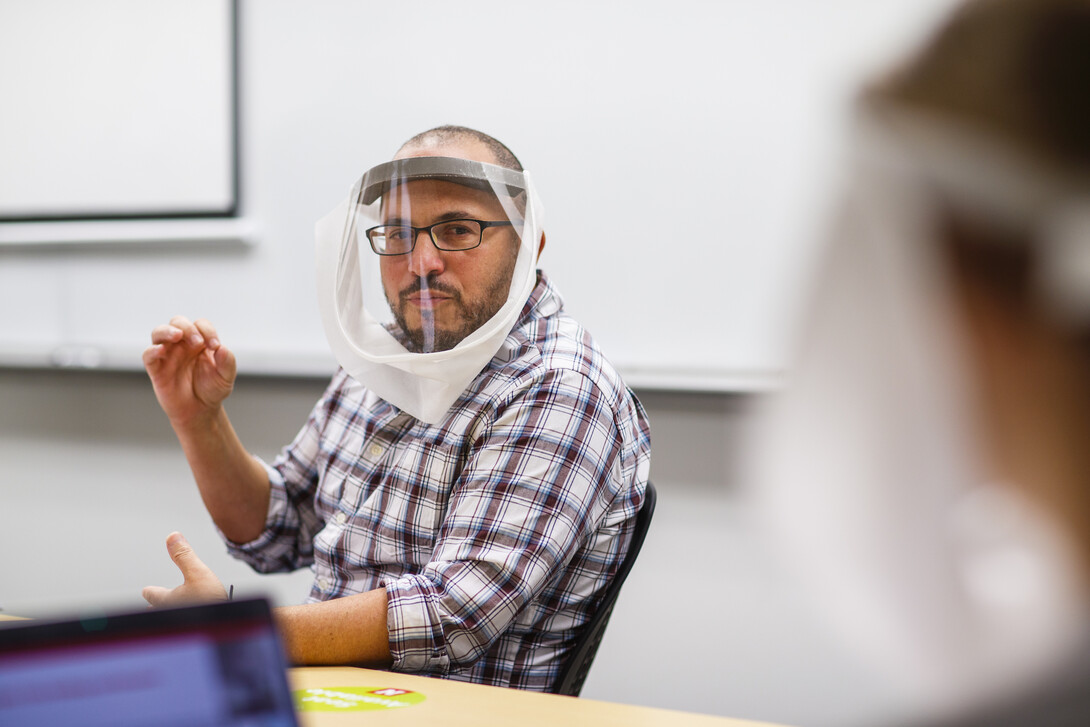
Jordan Soliz loves his job.
As a professor of communication studies at the University of Nebraska–Lincoln, Soliz is an advocate for and researcher of multi-ethnic-racial and interfaith families, building out deeper knowledge and understanding of the diverse experiences of America’s kin.
He was also a first-generation college student who found his way into academia and teaching through the mentors he met at various stops in his educational journey.
Soliz sat down with Nebraska Today to talk about his research, the challenges of this academic year and how, as a dad and teacher, he’s helping his kids and students navigate the world around them.

Let’s talk about a little bit about your background. Where did you grow up? What was your path to the University of Nebraska–Lincoln?
I grew up back and forth between Kansas City and Northern California, depending on what parent I was living with. Right after high school, I decided I wanted to stay in Kansas City. I didn’t exactly know what I wanted to do, so I went to community college for three years, kind of on and off part-time, and then I went to the university.
Neither of my parents went to college, so I didn’t quite know what I was supposed to do or what I wanted to do. It was in a research methods class where I realized that you could actually research social issues — you could research things that were really interesting to you. I put a project proposal together that looked at how our experiences in the family shape our attitudes toward the world, shape how we view others, shape our biases and everything else. That professor told me about academia, and he told me I could do this job as a professor. I ended up getting my master’s. I went and worked in the corporate world for a while, but I realized I wanted to get a Ph.D. I wanted to teach. I wanted to research. I got my Ph.D. at the University of Kansas and had a few options afterwards and decided to come to the University of Nebraska in 2004.
What led you to pursue research into family communication, specifically multi-ethnic family communication?
I grew up in families with different ethnicities, different religions. I realized, as I was growing up, that my experiences were fairly unique, but I also realized that it shaped my perception of the world. As I started reading more about families or reading more about research on identity and difference, I realized two things. When people talk about family, they oftentimes assume there’s a lot of homogeneity, right? Same religion, same race, same ethnicity. Or, when they talked about issues with interracial, interethnic, interfaith relationships, it was in society, not in our personal relationships. And I realized, “Wait a minute, this doesn’t speak to me at all. I wonder if it speaks to other people.” And that’s how I started my research. That’s how I started really getting into what I was interested in, and it’s taken off from there.
What is your favorite thing about life as a professor?
I had a professor in my master’s program who told me that this is an incredible life, because you get paid and you get to make a living reading, researching, writing and changing the lives of people — whether it’s through research, through teaching or working with the community as part of your program of scholarship. And I would say it’s exactly that. Very few people, I think, love their jobs, and I’m one of those who is that fortunate.
What does your semester look like now, and how are you approaching teaching differently?
It’s a very unique situation. I think all of us would admit that it’s not ideal. And it’s not something we’ve been trained for, and we’re trying to do the best we can. We actually talked about this a few weeks ago in my department, and it’s really about, I would say, latitude and compassion. What I mean by that is: We have to give a lot of latitude for students, understanding what they’re going through. It’s very difficult, not just the structure of this, but also, they’re still doing this during a pandemic. They’re still doing this while there’s a lot of injustice happening. A lot more latitude, a lot more communication with them is better. They’re probably thinking they get way too many emails from me.
We have to have a lot of compassion for them and ourselves, too, recognizing that this isn’t going to be our best teaching semester. We’re going to try to do the best we can and understand those various perspectives on this. It’s latitude and compassion for ourselves, for our students, for our colleagues. I think that’s kind of how we’re getting through this right now.
Speaking of injustice: With all of the national discussion regarding race and social justice, what does your research illustrate that can be helpful for families to navigate those conversations?
First of all, families need to have these conversations, and they need to recognize their own experiences and where they’re coming from. Families that have a privileged background — or if their children or family members don’t experience this directly — families need to recognize that and be direct with that. They’re responsible for families that have experienced marginalization and prejudice and discrimination.
Some of my research has shown that a really important part of the socialization of identity, especially for individuals from marginalized groups, is preparing them to deal with bias, prejudice and discrimination. And this is nothing new. This has been written about for decades — the extra burden that (marginalized) families have and communities have of socializing younger generations.
In some of our research, we’ve seen different models of this, where some people will say, “It really helped that my parents talked about this and told me not to get too upset or angry and really to see how I can enact change.” Other people have said, “We didn’t talk about any of this.” And that’s problematic, especially in some of our research of individuals in mixed ethnic or racial groups, when their parents never talked about the fact that they’re going to have to deal with bias and prejudice. They acted like they didn’t see race or ethnicity. The problem is, they got out in the world and realized everyone else did, and they weren’t prepared for it. Having those conversations is important.
Is that what you mean when you talk about your research — the socialization processes that have buffer effects against discrimination?
I don’t think there’s one size that fits all, but especially when you’re talking about my primary research area, where you have individuals that are mixed race and ethnicity, it’s the most valuable communication from parents and other family members. Talking about this and recognizing there are differences in the family and recognizing or letting them know that society’s going to view them in a certain way and just talking openly about this.
The more detrimental type of communication in the family was when family members would prefer one side, like, “You’re really this,” or talk negatively about another side, another ethnicity or race within the family, which is actually a part of you. The silence about race and ethnicity can be detrimental. Have these open conversations, but in a way that really affirms experiences or prepares children for what they may experience.
You’re a dad with three children. How have you approached all this with your family?
I would say one thing my wife and I have always tried, even prior to this year, was to make them understand how lucky and privileged they are. Like every parent, we want to give our kids experiences or a lifestyle we didn’t have, so it’s really about making sure they understand that and appreciate it. They have experiences that we didn’t have; they have opportunities that we didn’t have. Whether it’s through their friends or in the community, or seeing other family members and their extended family, they need to recognize how fortunate they are. That’s kind of our overall way.
In terms of the last few months — in terms of the pandemic — like a lot of people, we’ve discussed, “Let’s not take things for granted anymore, right? Let’s really try to appreciate everything.” Whether it’s me no longer getting frustrated when I have to drive them around to activities, or them not getting frustrated with homework or something like that, we really are appreciating all those moments.
When it comes down to the social and racial injustice, one of the things we talk about a lot is that you have to do something. You can’t simply rage on social media. You can’t just get upset about this at the dinner table. If my kids were here, they would probably say, “If you’re going to complain about something, the first thing Dad’s going to do is say, ‘OK, what have you done about it?’” And that’s something that I really challenged them to do, and whatever their cause is, do something. They have to make sure that they’ve made an impact. And if not, those are wasted opportunities. And they probably get sick of me saying it.







